a&e features
Conflict and profound loss: the AIDS epidemic and religious protest
Part 2 of our series on the history of LGBTQ religion in D.C.
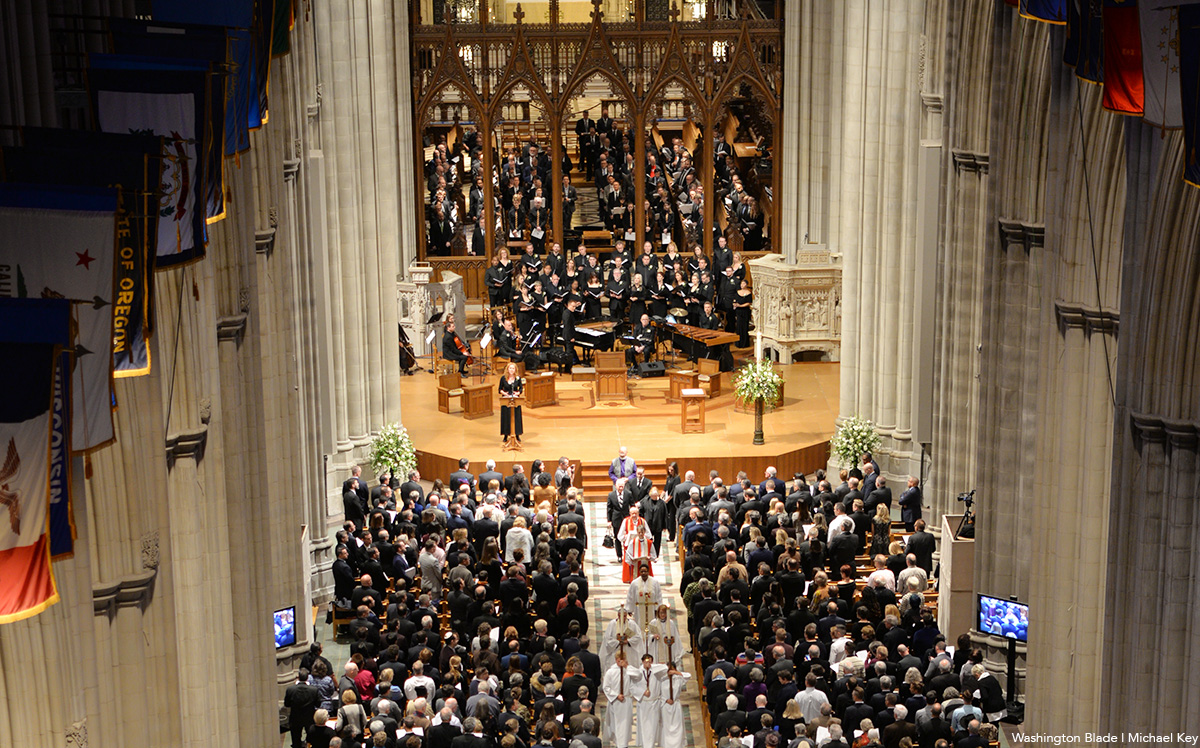
(Editor’s note: Although there has been considerable scholarship focused on LGBTQ community and advocacy in D.C., there is a deficit of scholarship focused on LGBTQ religion in the area. Religion plays an important role in LGBTQ advocacy movements, through queer-affirming ministers and communities, along with queer-phobic churches in the city. This is part two of a three-part series exploring the history of religion and LGBTQ advocacy in Washington, D.C.)
The Gay Liberation Front of DC previously organized a Gay Pride Week in 1972, by the efforts of Chuck Hall, Bruce Pennington, and Cade Ware. Deacon Maccubbin was still perplexed how Washington, D.C., which had a diverse gay scene, albeit a segregated one, did not have a large festival to gather together like that in New York. Together with former Gay Activists Alliance president Bob Carpenter, Maccubbin set out to plan a Pride event specific to the city, and on June 22, 1975, “Gay Pride Day” was the first officially recognized Pride celebration in D.C. The first Gay Pride Day was scheduled one week in advance of the Christopher Street Liberation Day parade in New York City so that LGBTQ D.C. residents could participate in that parade alongside others along the East Coast.
One year later, the timing sparked controversy because Gay Pride Day fell on June 20, also Father’s Day. John Wilson’s opponent in the Democratic primary election spoke out against Wilson’s support of holding Pride Day on the 20th. His opponent argued that Wilson was “an embarrassment to the city for introducing a Council resolution allowing Gay Pride Day to fall on Father’s Day.” Similarly William Stahr of Baltimore shared in a column in The Washington Star that the Council decision “is outrageously anti-social because the encouragement of homosexuality weakens society by undermining the family.”
LGBTQ community representative David L. Aiken wrote a letter back to the editor of The Washington Star on June 18, 1976 explaining the community’s decision.
“Gays do not threaten fatherhood, motherhood, or any other traditional values. Many people who are fathers or mothers have a realization that there is another side to their personality that can be expressed through gay love. The two are not mutually exclusive. What gay pride does challenge, however, is the bigoted assumption that heterosexual relations are the only kind about which it is polite to speak.”
Many Catholic priests in the area were upset that it fell on Father’s Day as well, which is celebrated in American Catholic churches with a special Mass that day, but the organizer of the second annual Gay Pride Day, Frank Akers, then a staff member at the Washington Blade, reported that the 1976 Gay Pride Day “was a success spiritually, if not financially.”
But the success of the 1976 Gay Pride Day was followed shortly after by the start of the HIV/AIDS pandemic. In the late 1970s, the HIV strain arrived in the United States and men who had sex with men were disproportionately affected. While LGBTQ individuals still faced intense persecution in secular and some religious spaces, the visibility of religiously motivated homophobia only grew and grew as conservative religious leaders like Anita Bryant and Jerry Falwell argued that HIV/AIDS was God’s punishment for the “promiscuity” of LGBTQ individuals. He made this especially clear in a discussion with MCC founder Troy Perry on July 6, 1983. Like many major cities, Washington, D.C. was hit hard but affirming organizations worked to provide care for LGBTQ people.
In 1982, D.C.’s MCC partnered with the Whitman-Walker Clinic, the NIH, MCC Baltimore, and Georgetown University Hospital to host one of the first AIDS forums in the nation (the event was held at the church). At a time when people were still weary of contact with HIV-positive individuals, water baptism was held by Faith Temple at Calvary Baptist Church in D.C. in 1986. This occurred at a time when many churches were not baptizing persons known or thought to be HIV positive or had AIDS. On Oct. 12, 1991, the NAMES Project Chapter and the Clergy Commission on AIDS coordinated the display of pieces of the AIDS Memorial Quilt at DMV churches, from St. Augustine Catholic Church to New Bethel Baptist Church to the National Cathedral.
The National Cathedral first began its ministry around HIV/AIDS in 1986, hosting a conference that same year to address how religion and religious communities can serve as allies and caregivers. The National Cathedral also displayed the quilt and organized services around the memorial in 1988, the year of the national tour of the Quilt, as well as in 1990, 1993, 1994, and 1996. Most recently, The Washington Cathedral also hosted the AIDS Memorial Quilt in July 2012, on the quilt’s 25th anniversary. From July 17-26, the Cathedral honored all those who died from AIDS and individuals who are living with HIV/AIDS. Dr. James Curran spoke during the interfaith memorial service at the Cathedral on Saturday, July 21.
However, at the same time, the Dignity chapter meeting at Georgetown University was forced to move to St. Margaret Episcopal Church after the Vatican released a letter by Cardinal Joseph Ratzinger claiming that LGBTQ individuals are “objectively disordered” in October 1986. Social and violent homophobia continued into the early 1990s, especially as focus on family rights were conflated with anti-LGBTQ legislation in the late 1980s. Another resurgence of family rights would occur in the late 2010s and early 2020s with the election of Donald Trump as president in 2016.
By the late 1990s and early 2000s, many more congregations were moving to become open and affirming. On Dec. 11, 2001, Bruce Pennington moderated a panel discussion “Creating Communities of Faith” featuring Faisal Alam, Jerry Goldberg, Andrew Hudson, Bob Miailovich, Dan Schellhorn, and Michael Vanzan. Ten years later, the DC Metropolitan Community Church celebrated 40 years of service to LGBTQ Washingtonians. As one of the first Metropolitan Community Churches in the DMV area, DC’s MCC was instrumental in founding the New Life MCC of Hampton Rocks, Norfolk, Va., in 1977, MCC of Northern Virginia, Oakton, Va., in 1981, Open Door MCC in Boyds, Md., in 1982, and Holy Redeemer MCC College Park, Md., in 1998.
That same year in 2011, Dignity/Washington hosted the National Convention of Dignity USA in D.C., during which four long-term Dignity couples from across the country were married by Dignity/Washington members under the new DC marriage equality laws. A number of other congregations also became actively involved in Capital Pride events, including the Cleveland Park UCC, First Congregational UCC, and Westmoreland UCC. The three groups hosted a UCC welcome book with other churches every year at the Capital Pride Festival up until the COVID-19 pandemic.
At the same time, new religious communities developed. Wiccan, neo-pagan, and pagan communities have long been spiritual refugees for LGBTQ communities, and pagan faith communities were first established in the DMV in the early 2010s. Also in 2011, Circle Sanctuary Ministers Jeanet and David Ewing founded the Potomac Circle Ministries in Northern Virginia to minister to pagans in the DMV area. In March 2013, Circle Sanctuary founder Rev. Selena Fox and other Circle Ministers attended the Marriage Equality rally in front of the U.S. Supreme Court, and she participated in the interfaith service at the Lutheran Church of the Reformation in Washington, DC. In November 2013, Jeanet and David Ewing performed a same-sex wedding in front of the Supreme Court in Washington, D.C.
What followed was a year of interfaith LGBTQ ministry in the DC area, which is celebrated every June with a Pride Interfaith Service held at a different DC worship space. The service is coordinated by DC Center Faith, the successor to the Celebration of the Spirit Coalition and the Washington Area Gay/Lesbian Interfaith Alliance which have been hosting interfaith services since 1983. In fact, much of the history of DC’s LGBTQ+ religious communities was recorded in November 2014 at an event organized by Center Faith called “Stepping Out” hosted at the Westminster Presbyterian Church, SW, D.C.
Center Faith partnered and still partners with Jewish, Christian, Muslim, Hindu, Sikh, Buddist, Unitarian universalist, Centers for Spiritual Living, Pagan, Wiccan, and Earth Religions faith communities who are supportive and inclusive of LGBTQ individuals. Through Center Faith, local faith leaders made strong connections through which they would gather and protest for LGBTQ rights. For example, faith leaders gathered together in front of the Supreme Court on Oct. 8, 2019 for the MoveOn Rally right as the Supreme Court heard a case that would overturn LGBTQ individuals’ right to work and allow employers to fire someone because they were LGBTQ.
Later into the 2010s, LGBTQ organizations exploring religion and humor came to be part of the D.C. area. The DC House of the Sisters of Perpetual Indulgence, “The Abbey of Magnificent Intentions” was approved by the United Nuns Privy Council in April 2016. Just as Deacon Maccubbin and David L. Aiken had done 30 years earlier, fighting back against conservative religious pushback to holding the Gay Pride Day on Father’s Day in 1976, the DC Sisters of Perpetual Indulgence came together on Oct. 8, 2022 to hold their fifth annual Lavender Mass — a counter event to the Red Mass. The Red Mass is a Catholic Mass held on the first Sunday of October to honor Catholics in positions of civil authority, like the Supreme Court Justices.
That Lavender Mass took place right before the March for Reproductive Rights following the overturn of Roe v. Wade in June 2022. This important moment in DC’s LGBTQ+ religious history will be explored next, reviewing the impact of this event right as the original founder of the Lavender Mass is stepping out of this role before moving out of the Capitol.
Emma Cieslik is presenting on LGBTQ+ Religion in the Capital at the DC History Conference on April 5. She is working with a DC History Fellow to establish a roundtable committed to recording and preserving this vital history. If you have any information about these histories, please reach out to Emma Cieslik at [email protected] or the Rainbow History Project at [email protected].
a&e features
Eastern Shore chef named James Beard Finalist
Harley Peet creates inventive food in an inclusive space

In a small Eastern Shore town filled with boutiques, galleries, and the occasional cry of waterfowl from the Chesapeake, Chef Harley Peet is most at home. In his Viennese-inflected, Maryland-sourced fine-dining destination Bas Rouge, Peet draws from his Northern Michigan upbringing, Culinary Institute of America education, and identity as a gay man, for inspiration.
And recently, Peet was named a James Beard Finalist for Best Chef: Mid-Atlantic – the first “Best Chef: Mid-Atlantic” finalist representing the Eastern Shore.
Peet, after graduation from the Culinary Institute of America, took a position as sous chef at Tilghman Island Inn, not far from Bas Rouge. Falling in love with the Eastern Shore, he continued his passion for racing sailboats, boating, gardening, and fishing, and living his somewhat pastoral life as he opened Bas Rouge in 2016 as head chef, a restaurant part of the Bluepoint Hospitality group, which runs more than a dozen concepts in and around Easton, Md.
Coming from a rural area and being gay, Peet knew he had his work cut out for him. He was always aware that the service and hospitality industry “can be down and dirty and rough.”
Now as a leader in the kitchen, he aims to “set a good example, and treat people how I want to be treated. I also want to make sure if you’re at our establishment, I’m the first to stand up and say something.”
The Bas Rouge cuisine, he says, is Contemporary European. “I’m inspired by old-world techniques of countries like Austria, Germany, and France, but I love putting a new spin on classic dishes and finding innovative ways to incorporate the bounty of local Chesapeake ingredients.”
His proudest dish: the humble-yet-elevated Wiener Schnitzel. “It is authentic to what one would expect to find in Vienna, down to the Lingonberries.” From his in-house bakery, Peet dries and grinds the housemade Kaiser-Semmel bread to use as the breadcrumbs.
Peet works to support the LGBTQ community inside and outside of the kitchen. “I love that our Bluepoint Hospitality team has created welcoming spaces where our patrons feel comfortable dining at each of our establishments. Our staff have a genuine respect for one another and work together free of judgment.”
Representing Bluepoint, Peet has participated in events like Chefs for Equality with the Human Rights Campaign, advocating for LGBTQ rights.
At Bas Rouge, Peet brings together his passion for inclusion steeped in a sustainability ethic. He sees environmental stewardship as a way of life. Peet and his husband have lived and worked on their own organic farm for several years. Through research in Europe, he learned about international marine sourcing. Witnessing the impacts of overfishing, Peet considers his own role in promoting eco-friendly practices at Bas Rouge. To that end, he ensures responsible sourcing commitments through his purveyors, relationships that have helped create significant change in how people dine in Easton.
“I have built great relationships in the community and there’s nothing better than one of our long-standing purveyors stopping in with a cooler of fresh fish from the Chesapeake Bay. This goes especially for catching and plating the invasive blue catfish species, which helps control the species’ threat to the local ecosystem.
Through his kitchen exploits, Peet expressed a unique connection to another gay icon in a rural fine-dining restaurant: Patrick O’Connell, of three Michelin starred Inn at Little Washington. In fact, Peet’s husband helped design some of O’Connell’s kitchen spaces. They’ve both been able to navigate treacherous restaurant-industry waters, and have come out triumphant and celebrated. Of O’Connell, Peet says that he “sees [his restaurants] as canvas, all artistry, he sees this as every night is a show.” But at the same time, his “judgment-free space makes him a role model.”
Being in Easton itself is not without challenges. Sourcing is a challenge, having to either fly or ship in ingredients, whereas urban restaurants have the benefit of trucking, he says. The small town “is romantic and charming,” but logistics are difficult – one of the reasons that Peet ensures his team is diverse, building in different viewpoints, and also “making things a hell of a lot more fun.”
Reflecting on challenges and finding (and creating) space on the Eastern Shore, Peet confirmed how important it was to surround himself with people who set a good example, and “if you don’t like the way something is going … move on.”
a&e features
What to expect at the 2024 National Cannabis Festival
Wu-Tang Clan to perform; policy discussions also planned

(Editor’s note: Tickets are still available for the National Cannabis Festival, with prices starting at $55 for one-day general admission on Friday through $190 for a two-day pass with early-entry access. The Washington Blade, one of the event’s sponsors, will host a LGBTQIA+ Lounge and moderate a panel discussion on Saturday with the Mayor’s Office of LGBTQ Affairs.)
With two full days of events and programs along with performances by Wu-Tang Clan, Redman, and Thundercat, the 2024 National Cannabis Festival will be bigger than ever this year.
Leading up to the festivities on Friday and Saturday at Washington, D.C.’s RFK Stadium are plenty of can’t-miss experiences planned for 420 Week, including the National Cannabis Policy Summit and an LGBTQ happy hour hosted by the District’s Black-owned queer bar, Thurst Lounge (both happening on Wednesday).
On Tuesday, the Blade caught up with NCF Founder and Executive Producer Caroline Phillips, principal at The High Street PR & Events, for a discussion about the event’s history and the pivotal political moment for cannabis legalization and drug policy reform both locally and nationally. Phillips also shared her thoughts about the role of LGBTQ activists in these movements and the through-line connecting issues of freedom and bodily autonomy.
After D.C. residents voted to approve Initiative 71 in the fall of 2014, she said, adults were permitted to share cannabis and grow the plant at home, while possession was decriminalized with the hope and expectation that fewer people would be incarcerated.
“When that happened, there was also an influx of really high-priced conferences that promised to connect people to big business opportunities so they could make millions in what they were calling the ‘green rush,'” Phillips said.
“At the time, I was working for Human Rights First,” a nonprofit that was, and is, engaged in “a lot of issues to do with world refugees and immigration in the United States” — so, “it was really interesting to me to see the overlap between drug policy reform and some of these other issues that I was working on,” Phillips said.
“And then it rubbed me a little bit the wrong way to hear about the ‘green rush’ before we’d heard about criminal justice reform around cannabis and before we’d heard about people being let out of jail for cannabis offenses.”
“As my interests grew, I realized that there was really a need for this conversation to happen in a larger way that allowed the larger community, the broader community, to learn about not just cannabis legalization, but to understand how it connects to our criminal justice system, to understand how it can really stimulate and benefit our economy, and to understand how it can become a wellness tool for so many people,” Phillips said.
“On top of all of that, as a minority in the cannabis space, it was important to me that this event and my work in the cannabis industry really amplified how we could create space for Black and Brown people to be stakeholders in this economy in a meaningful way.”

“Since I was already working in event production, I decided to use those skills and apply them to creating a cannabis event,” she said. “And in order to create an event that I thought could really give back to our community with ticket prices low enough for people to actually be able to attend, I thought a large-scale event would be good — and thus was born the cannabis festival.”
D.C. to see more regulated cannabis businesses ‘very soon’
Phillips said she believes decriminalization in D.C. has decreased the number of cannabis-related arrests in the city, but she noted arrests have, nevertheless, continued to disproportionately impact Black and Brown people.
“We’re at a really interesting crossroads for our city and for our cannabis community,” she said. In the eight years since Initiative 71 was passed, “We’ve had our licensed regulated cannabis dispensaries and cultivators who’ve been existing in a very red tape-heavy environment, a very tax heavy environment, and then we have the unregulated cannabis cultivators and cannabis dispensaries in the city” who operate via a “loophole” in the law “that allows the sharing of cannabis between adults who are over the age of 21.”
Many of the purveyors in the latter group, Phillips said, “are looking at trying to get into the legal space; so they’re trying to become regulated businesses in Washington, D.C.”
She noted the city will be “releasing 30 or so licenses in the next couple of weeks, and those stores should be coming online very soon” which will mean “you’ll be seeing a lot more of the regulated stores popping up in neighborhoods and hopefully a lot more opportunity for folks that are interested in leaving the unregulated space to be able to join the regulated marketplace.”
National push for de-scheduling cannabis
Signaling the political momentum for reforming cannabis and criminal justice laws, Wednesday’s Policy Summit will feature U.S. Sens. Raphael Warnock (D-Ga.), Jeff Merkley (D-Ore.), Elizabeth Warren (D-Mass.), and Chuck Schumer (D-N.Y.), the Senate majority leader.
Also representing Capitol Hill at the Summit will be U.S. Congresswoman Eleanor Holmes Norton (D-D.C.) and U.S. Reps. Earl Blumenauer (D-Ore.) and Barbara Lee (D-Calif.) — who will be receiving the Supernova Women Cannabis Champion Lifetime Achievement Award — along with an aide to U.S. Rep. David Joyce (R-Ohio).
Nationally, Phillips said much of the conversation around cannabis concerns de-scheduling. Even though 40 states and D.C. have legalized the drug for recreational and/or medical use, marijuana has been classified as a Schedule I substance since the Controlled Substances Act was passed in 1971, which means it carries the heftiest restrictions on, and penalties for, its possession, sale, distribution, and cultivation.
The U.S. Department of Health and Human Services formally requested the drug be reclassified as a Schedule III substance in August, which inaugurated an ongoing review, and in January a group of 12 Senate Democrats sent a letter to the Biden-Harris administration’s Drug Enforcement Administration urging the agency to de-schedule cannabis altogether.
Along with the Summit, Phillips noted that “a large contingent of advocates will be coming to Washington, D.C. this week to host a vigil at the White House and to be at the festival educating people” about these issues. She said NCF is working with the 420 Unity Coalition to push Congress and the Biden-Harris administration to “move straight to de-scheduling cannabis.”
“This would allow folks who have been locked up for cannabis offenses the chance to be released,” she said. “It would also allow medical patients greater access. It would also allow business owners the chance to exist without the specter of the federal government coming in and telling them what they’re doing is wrong and that they’re criminals.”
Phillips added, however, that de-scheduling cannabis will not “suddenly erase” the “generations and generations of systemic racism” in America’s financial institutions, business marketplace, and criminal justice system, nor the consequences that has wrought on Black and Brown communities.
An example of the work that remains, she said, is making sure “that all people are treated fairly by financial institutions so that they can get the funding for their businesses” to, hopefully, create not just another industry, but “really a better industry” that from the outset is focused on “equity” and “access.”
Policy wonks should be sure to visit the festival, too. “We have a really terrific lineup in our policy pavilion,” Phillips said. “A lot of our heavy hitters from our advocacy committee will be presenting programming.”
“On Saturday there is a really strong federal marijuana reform panel that is being led by Maritza Perez Medina from the Drug Policy Alliance,” she said. “So that’s going to be a terrific discussion” that will also feature “representation from the Veterans Cannabis Coalition.”
“We also have a really interesting talk being led by the Law Enforcement Action Partnership about conservatives, cops, and cannabis,” Phillips added.
Cannabis and the LGBTQ community
“I think what’s so interesting about LGBTQIA+ culture and the cannabis community are the parallels that we’ve seen in the movements towards legalization,” Phillips said.
The fight for LGBTQ rights over the years has often involved centering personal stories and personal experiences, she said. “And that really, I think, began to resonate, the more that we talked about it openly in society; the more it was something that we started to see on television; the more it became a topic in youth development and making sure that we’re raising healthy children.”
Likewise, Phillips said, “we’ve seen cannabis become more of a conversation in mainstream culture. We’ve heard the stories of people who’ve had veterans in their families that have used cannabis instead of pharmaceuticals, the friends or family members who’ve had cancer that have turned to CBD or THC so they could sleep, so they could eat so they could get some level of relief.”
Stories about cannabis have also included accounts of folks who were “arrested when they were young” or “the family member who’s still locked up,” she said, just as stories about LGBTQ people have often involved unjust and unnecessary suffering.
Not only are there similarities in the socio-political struggles, Phillips said, but LGBTQ people have played a central role pushing for cannabis legalization and, in fact, in ushering in the movement by “advocating for HIV patients in California to be able to access cannabis’s medicine.”
As a result of the queer community’s involvement, she said, “the foundation of cannabis legalization is truly patient access and criminal justice reform.”
“LGBTQIA+ advocates and cannabis advocates have managed to rein in support of the majority of Americans for the issues that they find important,” Phillips said, even if, unfortunately, other movements for bodily autonomy like those concerning issues of reproductive justice “don’t see that same support.”
a&e features
Juliet Hawkins’s music defies conventional categorization
‘Keep an open mind, an open heart, and a willingness to evolve’
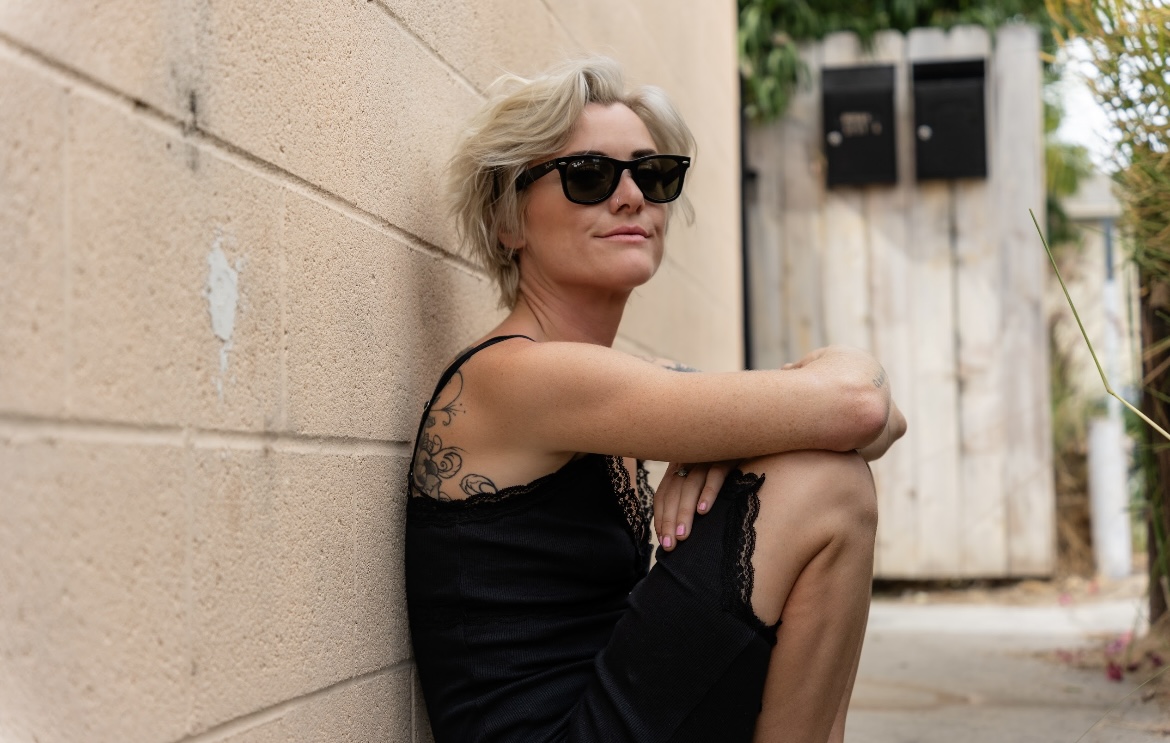
LONG BEACH, Calif. – Emerging from the dynamic music scene of Los Angeles, Juliet Hawkins seamlessly integrates deeply soulful vocals with contemporary production techniques, crafting a distinctive sound that defies conventional categorization.
Drawing inspiration from the emotive depth of Amy Winehouse and weaving together elements of country, blues, and pop, Hawkins’ music can best be described as a fusion–perhaps best termed as soulful electronica. Yet, even this characterization falls short, as Hawkins defines herself as “a blend of a million different inspirations.”
Hawkins’s musical palette mirrors her personae: versatile and eclectic. Any conversation with Hawkins makes this point abundantly clear. She exhibits the archetype of a wild, musical genius while remaining true to her nature-loving, creative spirit. Whether recording in the studio for an album release, performing live in a studio setting, or playing in front of a live audience, Hawkins delivers her music with natural grace.
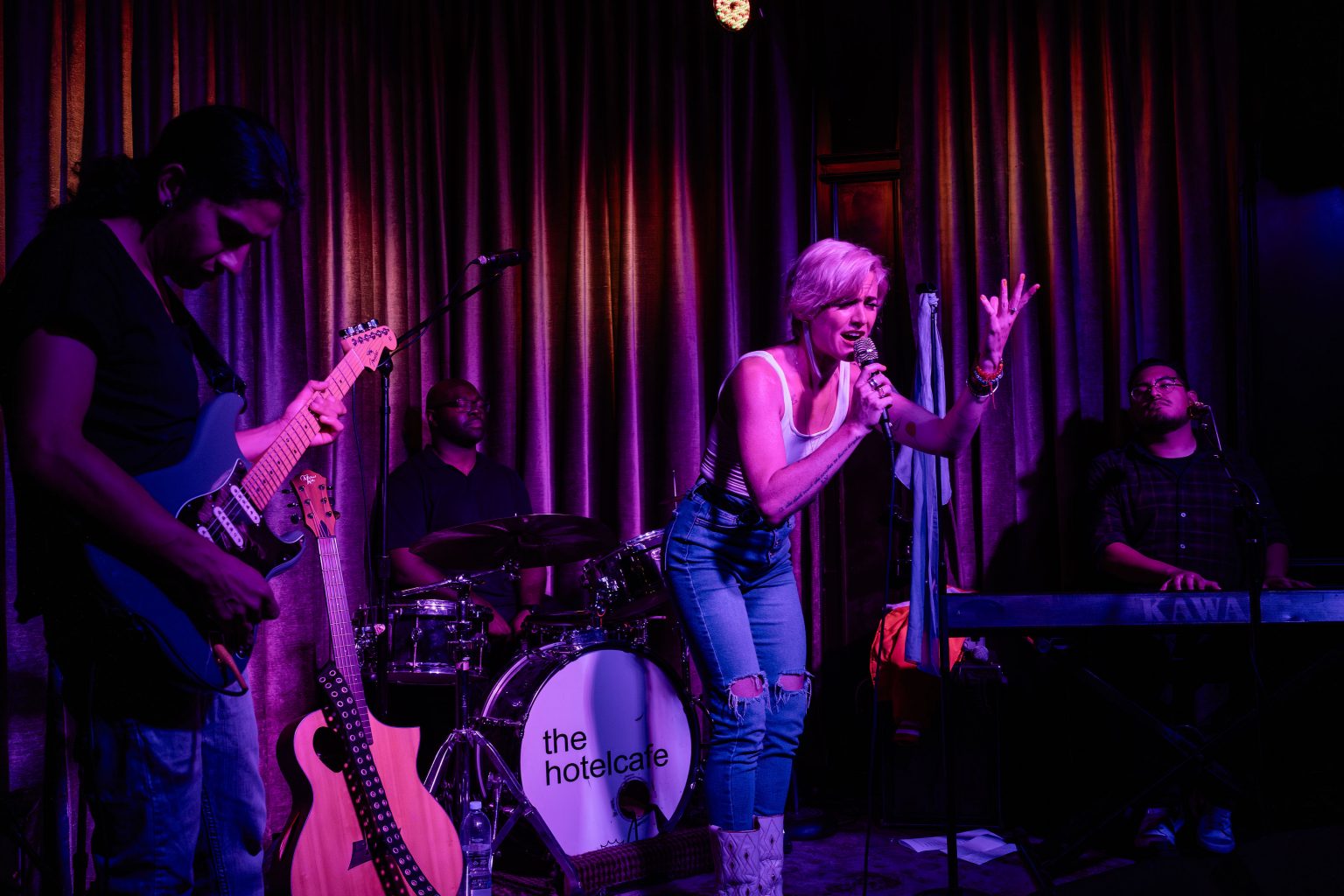
However, Hawkins’s musical journey is far from effortless. Amid personal challenges and adversity, she weaves her personal odyssey of pain and pleasure, transforming these experiences into empowering anthems.
In a candid interview with the Blade, Hawkins spoke with profound openness and vulnerability about her past struggles with opiate and heroin addiction: “That was 10 years ago that I struggled with opiates,” she shared. Yet, instead of letting her previous addiction define her, Hawkins expressed to the Blade that she harbors no shame about her past. “My newer music is much more about empowerment than recovery,” she explained, emphasizing that “writing was the best way to process trauma.”
Despite her struggles with addiction, Hawkins managed to recover. However, she emphasizes that this recovery is deeply intertwined with her spiritual connection to nature. An illustrative instance of Hawkins’ engagement with nature occurred during the COVID pandemic.
Following an impulse that many of us have entertained, she bought a van and chose to live amidst the trees. It was during this period that Hawkins composed the music for her second EP, titled “Lead with Love.”
In many ways, Hawkins deep spiritual connection to nature has been profoundly shaped by her extensive travels. Born in San Diego, spending her formative years in Massachusetts, and later moving to Tennessee before returning to Southern California, she has broadened her interests and exposed herself to the diverse musical landscapes across America.
“Music is the only thing I have left,” Hawkins confides to the Blade, highlighting the integral role that music has in her life. This intimate relationship with music is evident in her sultry and dynamic compositions. Rather than imitating or copying other artists, Hawkins effortlessly integrates sounds from some of her favorite musical influences to create something new. Some of these influences include LP, Lucinda Williams, Lana Del Rey, and, of course, Amy Winehouse, among others.
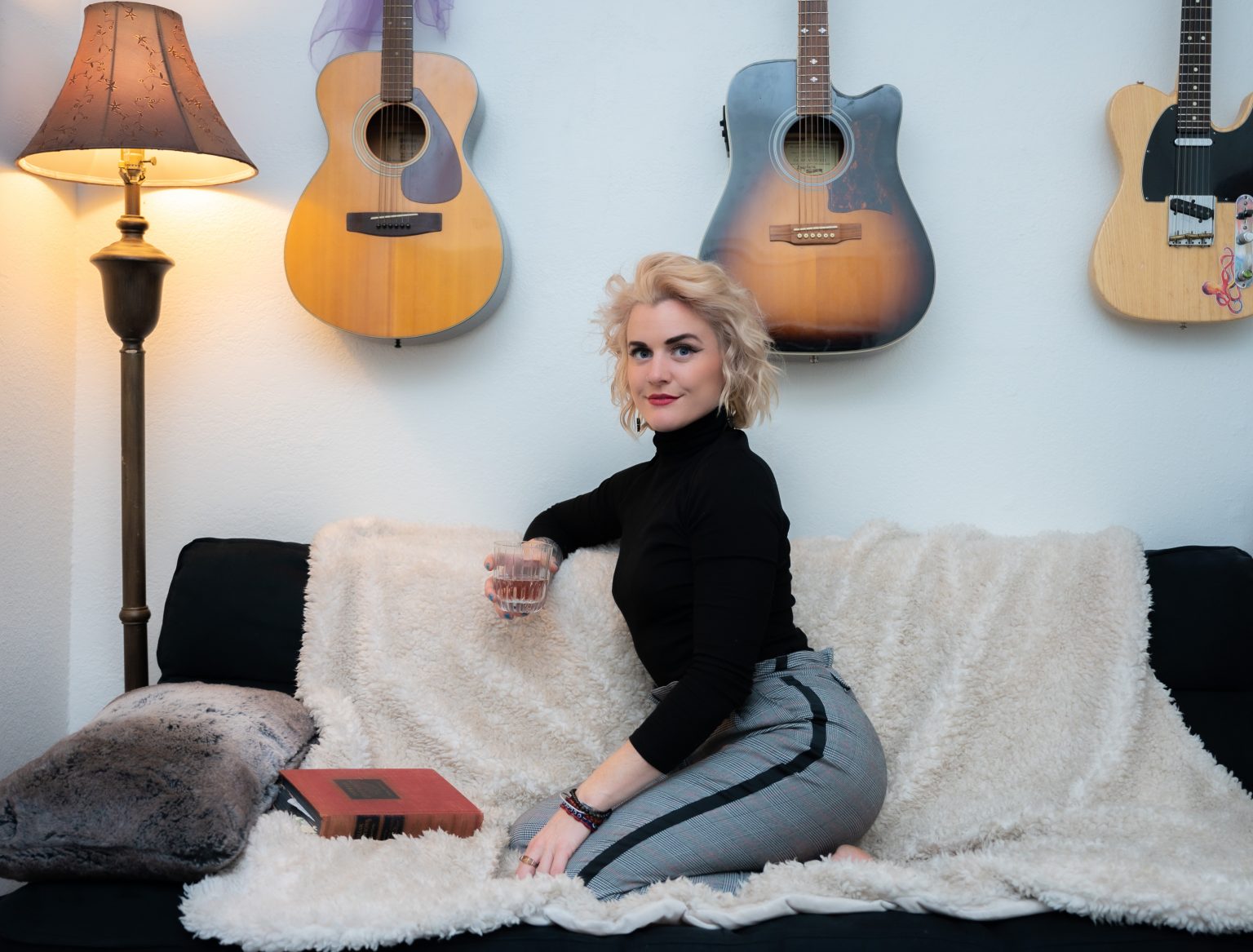
Hawkins has always been passionate about music—-she began with piano at a young age, progressed to guitar, and then to bass, eagerly exploring any instrument she could get her hands on. However, instead of following a traditional path of formalized lessons and structured music theory, Hawkins told the Blade that she “has a hard time following directions and being told what to do.”
This independent approach has led her to experiment with various genres and even join unexpected groups, such as a tribute band for Eric Clapton and Cream. While she acknowledges that her eclectic musical interests might be attributed to ADHD, she holds a different belief: “Creative minds like to move around.”
When discussing her latest musical release — “Stay True (the live album)” which was recorded in a live studio setting — Hawkins describes the experience as a form of improvisation with both herself and the band:
“[The experience] was this divine honey that was flowing through all of us.” She explains that this live album was uncertain in the music’s direction. “For a couple of songs,” Hawkins recalls, “we intuitively closed them out.” By embracing creative spontaneity and refusing to be constrained by fear of mistakes, the live album authentically captures raw sound, complete with background chatter, extended outros, and an extremely somber cover of Ozzy Osbourne’s “Crazy Train” coupled with a slow piano and accompanied strings.
While “Stay True” was a rewarding experience for Hawkins, her favorite live performance took place in an unexpected location—an unattended piano in the middle of an airport. As she began playing Beethoven’s “Moonlight Sonata”, Hawkins shared with the Blade a universal connection we all share with music: “This little girl was dancing as I was playing.”
After the performance, tears welled in Hawkins’ eyes as she was touched by the young girl’s appreciation of her musicianship. Hawkins tells the Blade, “It’s not about playing to an audience—it’s about finding your people.”
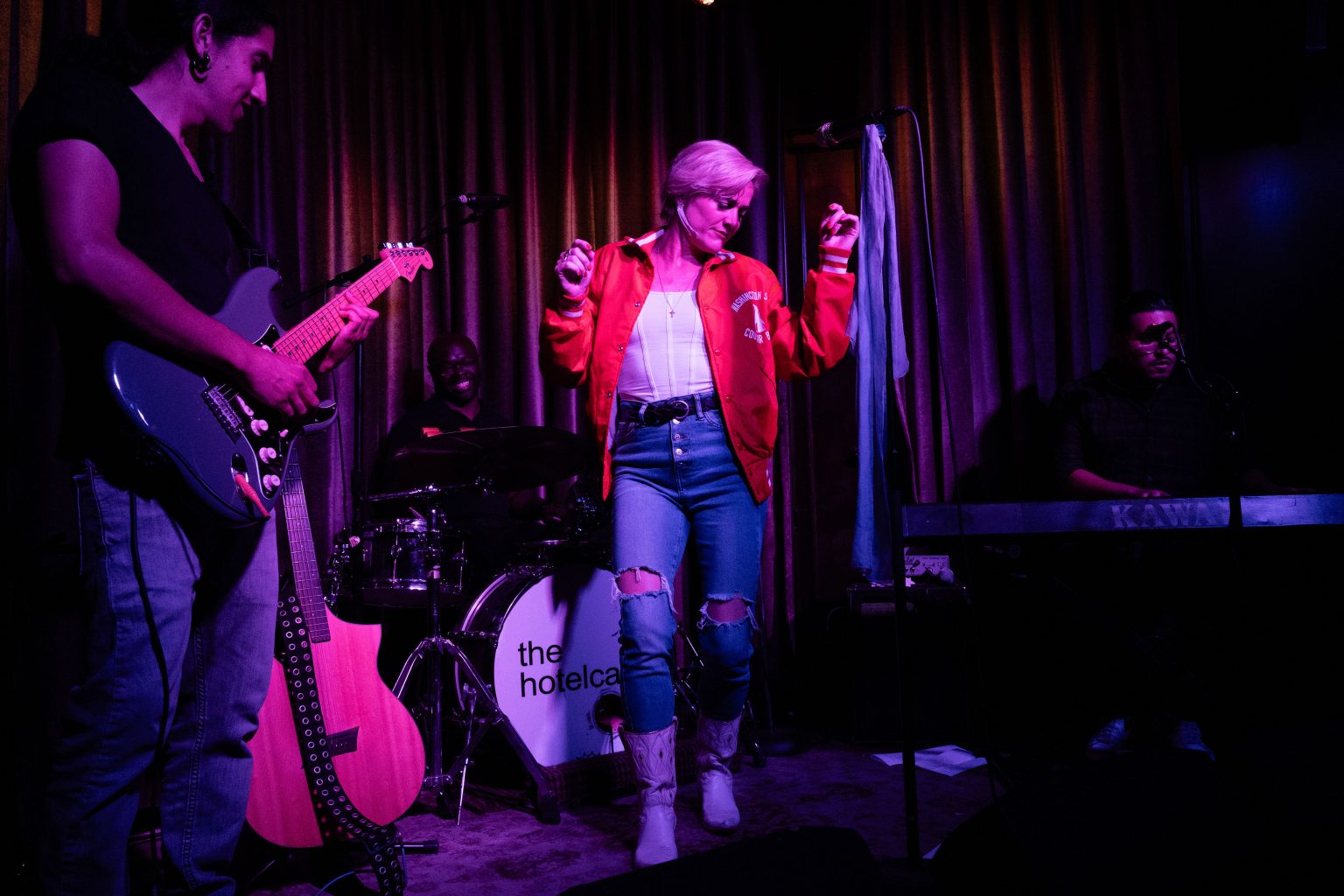
What sets Hawkins apart as an artist is her ability to connect with her audience in diverse settings. She highlights EDC, an electronic dance music festival, as a place where she unabashedly lets her “freak flag” fly and a place to connect with her people. Her affinity for electronic music not only fuels her original pop music creations, but also inspires her to reinterpret songs with an electronic twist. A prime example of this is with her electronic-style cover of Tal Bachman’s 90’s hit, “She’s So High.”
As an openly queer woman in the music industry, Hawkins is on a mission to safeguard artistic integrity. In songs like “My Father’s Men,” she bares her vulnerability and highlights the industry’s misogyny, which often marginalizes gender minorities in their pursuit of artistic expression.
She confides to the Blade, “The industry can be so sexist, misogynist, and oppressive,” and points out that “there are predators in the industry.” Yet, rather than succumbing to apathy, Hawkins is committed to advocating for gender minorities within the music industry.
“Luckily, people are rising up against misogyny, but it’s still there. ‘My Father’s Men’ is a message: It’s time for more people who aren’t just white straight men to have a say.”
Hawkins is also an activist for other causes, with a fervent belief in the preservation of bodily autonomy. Her self-directed music video “I’ll play Daddy,” showcases the joy of embracing one’s body with Hawkins being sensually touched by a plethora of hands. While the song, according to Hawkins, “fell upon deaf ears in the south,” it hasn’t stopped Hawkins from continuing to fight for the causes she believes in. In her interview, Hawkins encapsulated her political stance by quoting an artist she admires:
“To quote Pink, ‘I don’t care about your politics, I care about your kids.’”
When Hawkins isn’t writing music or being a champion for various causes, you might catch her doing the following: camping, rollerblading, painting, teaching music lessons, relaxing with Bernie (her beloved dog), stripping down for artsy photoshoots, or embarking on a quest to find the world’s best hollandaise sauce.
But at the end of the day, Hawkins sums up her main purpose: “To come together with like-minded people and create.”
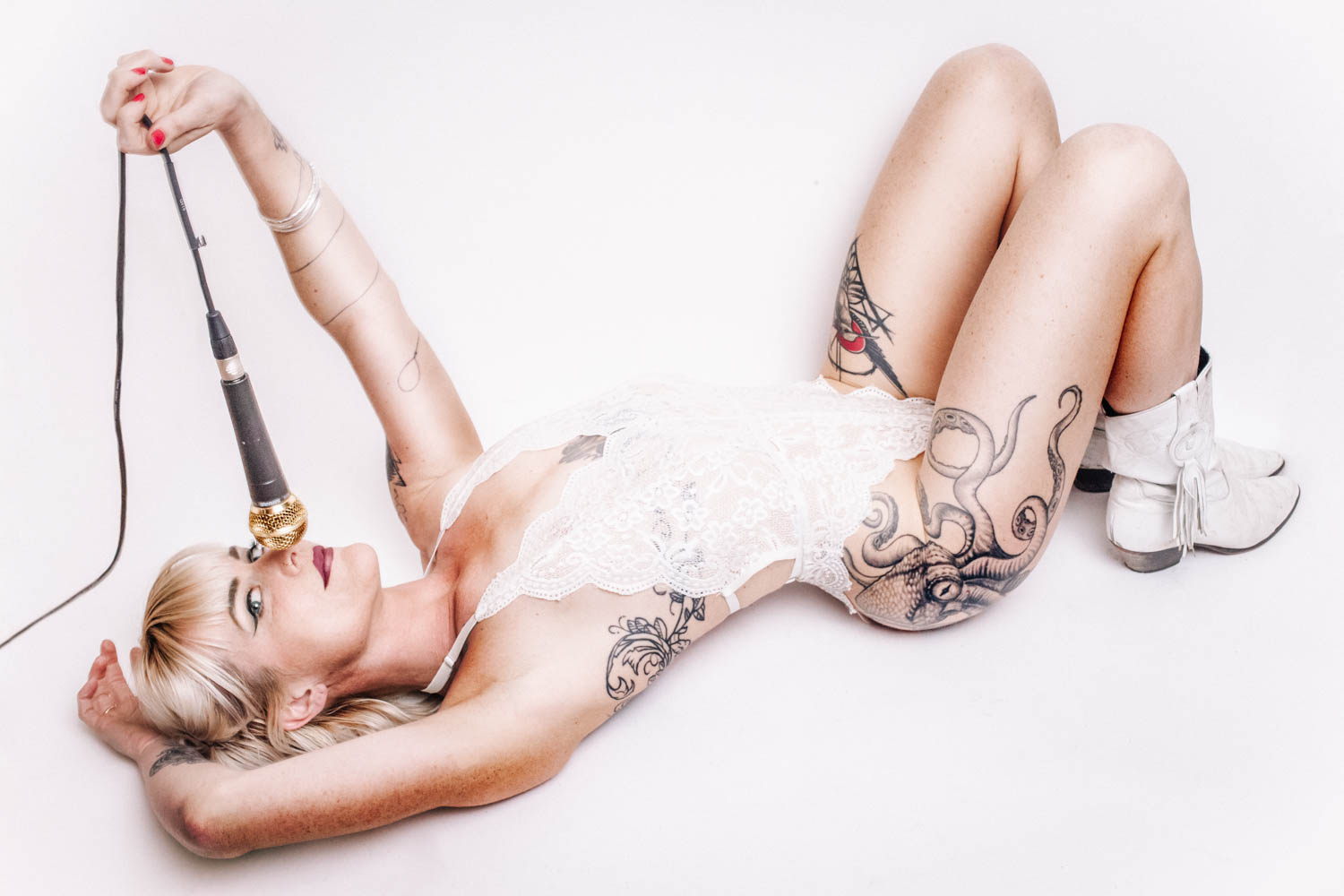
Part of this ever-evolving, coming-of-age-like journey includes an important element: plant-based medicine. Hawkins tells the Blade that she acknowledges her previous experience with addiction and finds certain plants to be useful in her recovery:
“The recovery thing is tricky,” Hawkins explains, “I don’t use opiates—-no powders and no pills—but I am a fan of weed, and I think psilocybin can be helpful when used at the right time.” She emphasizes the role of psychedelics in guiding her towards her purpose. “Thanks for psychedelics, I have a reignited sense of purpose … Music came naturally to me as an outlet to heal.”
While she views the occasional dabbling of psychedelics as a spiritual practice, Hawkins also embraces other rituals, particularly those she performs before and during live shows. “I always carry two rocks with me: a labradorite and a tiger’s eye marble,” she explains.
-

 State Department3 days ago
State Department3 days agoState Department releases annual human rights report
-

 Maryland5 days ago
Maryland5 days agoJoe Vogel campaign holds ‘Big Gay Canvass Kickoff’
-

 Politics4 days ago
Politics4 days agoSmithsonian staff concerned about future of LGBTQ programming amid GOP scrutiny
-

 District of Columbia1 day ago
District of Columbia1 day agoCatching up with the asexuals and aromantics of D.C.












